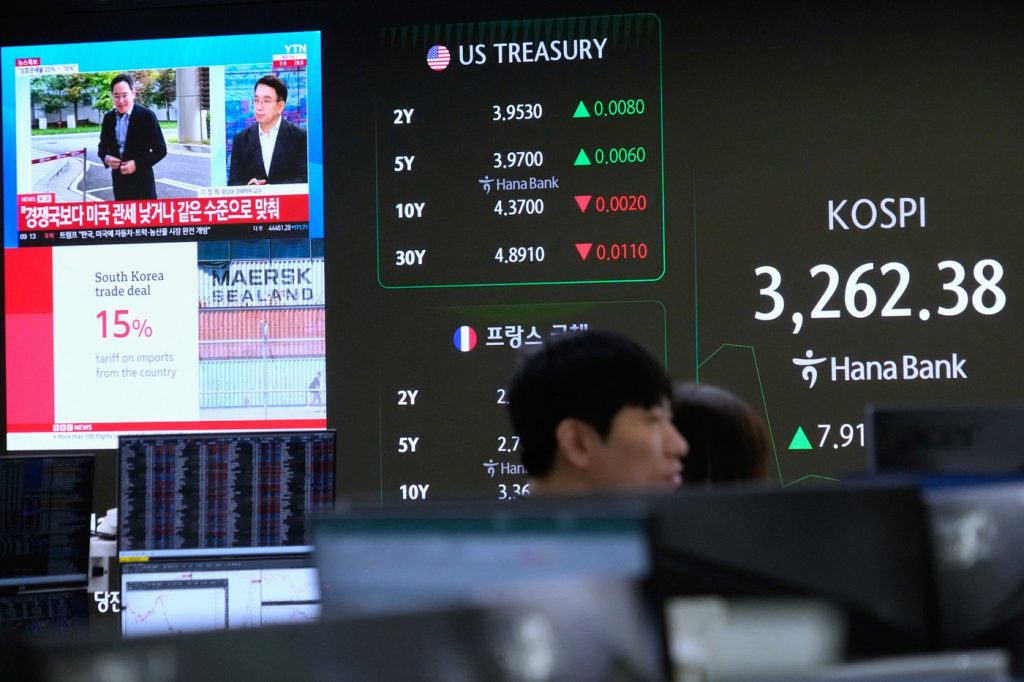MANILA, Philippines (AP) — Asian markets presented a mixed picture on Thursday, following a slight decline in most U.S. stocks that emerged from growing doubts about the Federal Reserve's willingness to implement interest rate cuts that could stimulate the economy by September.
In Japan, the Nikkei 225 rose by 0.9% to close at 41,020.91 points after the Bank of Japan decided to maintain interest rates at 0.5% while revising its inflation forecasts upward. This decision comes on the heels of a trade agreement reached between Tokyo and Washington.
Conversely, Hong Kong’s Hang Seng index dipped by 1% to 24,920.67, while the Shanghai Composite Index fell by 0.7% to 3,588.73. In Seoul, the Kospi index marginally decreased by 0.3%, closing at 3,244.40. This drop follows South Korea's agreement on a 15% tariff deal with the U.S., which notably excludes levies on American products such as cars, trucks, and agricultural goods. Additionally, the agreement entails South Korea purchasing $100 billion worth of U.S. energy imports and investing $350 billion in the United States.
Australia’s S&P ASX 200 saw a slight decrease of 0.1%, dropping to 8,743.80, while India’s BSE Sensex managed to rise by 0.2% to 81,481.86. Taiwan’s TAIEX showed modest growth of 0.4%, ending at 23,551.92.
In a commentary from Rabo Bank, concerns were raised regarding U.S. trade deals with various countries, including Bangladesh. The bank suggested that it’s only a matter of time before India finalizes terms to retain advantageous access to the U.S. and other markets influenced by U.S. President Donald Trump’s economic strategies. Rabo indicated that a potential U.S.-India trade deal would likely involve Indian purchases of American arms and energy, along with preferential access to U.S. agricultural products.
Notably, Rabo Bank warned that Australia might face disadvantages in this scenario, as the U.S. is poised to increase wheat exports to Indonesia and Bangladesh, along with supplying more liquefied natural gas (LNG) to Japan and South Korea, which might displace Australian exports from their traditional markets.
On a related note, President Trump announced a 25% tariff on imports from India and an additional tax due to India's purchases of Russian oil, effective from August 1. This comes alongside proposed tariffs on many other countries, unless new trade agreements are reached to reduce these rates. However, Trump noted that negotiations were ongoing between the two nations.
State-side, the market experienced slight turbulence; on Wednesday, the S&P 500 edged down by 0.1%, ending its previous streak of all-time highs over six consecutive days. The Dow Jones Industrial Average dropped 171 points, representing a 0.4% decrease, whereas the Nasdaq composite inched up by 0.1%.
Stocks in the U.S. faced pressure from rising Treasury yields following the Federal Reserve’s decision to maintain its main interest rate. This move, while anticipated on Wall Street, could set up friction with Trump, who has been advocating for lower interest rates. Fed Chair Jerome Powell managed to surprise investors by tempering expectations of an imminent rate cut at their next meeting in September. Despite calls from both Trump and two dissenting Fed committee members for a rate decrease to stimulate the economy, Powell remained noncommittal, noting that inflation still outpaces the Fed’s target of 2% and that the job market appears to be “in balance.”
A reduction in interest rates could potentially provide a boost to both the job market and the overall economy; however, it might also run the risk of escalating inflation due to Trump’s tariffs, which are anticipated to increase consumer prices across the U.S. The Federal Reserve’s dual mandate involves maintaining both a healthy job market and stable inflation rates.
In commodities, U.S. benchmark crude oil saw a decrease of 4 cents, settling at $69.96 per barrel, while Brent crude, the international standard, reduced by 13 cents to $72.34 per barrel. The U.S. dollar was also lower, trading at 148.87 Japanese yen compared to 149.44 the previous day, while the euro appreciated to $1.1422 from $1.1412.











